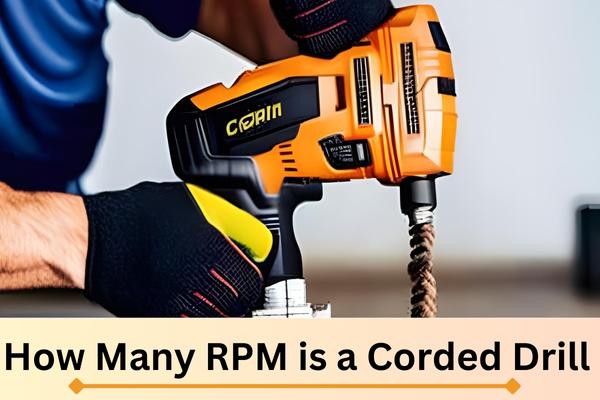In the world of power tools, corded drills are essential companions for both professionals and DIY enthusiasts. Many tasks can be performed with these versatile devices, including drilling holes and driving screws. However, one critical factor that determines their performance is their speed, measured in RPM (Revolutions Per Minute). In this comprehensive guide, we’ll delve into the world of corded drills and answer the burning question: “How many RPM is a corded drill?”

Understanding Corded Drills: A Brief Overview
Before we jump into RPM specifics, let’s get acquainted with what a corded drill is. A corded drill is a power tool that operates by plugging it into an electrical outlet. Unlike cordless drills, which rely on rechargeable batteries, corded drills have a constant power source, making them ideal for heavy-duty tasks that require consistent performance.
What’s RPM, and Why Does It Matter?
RPM, or Revolutions Per Minute, measures how many times the drill’s chuck (the part that holds the drill bit) rotates in one minute. This metric plays a pivotal role in a corded drill’s functionality and performance. Here’s why RPM matters:
1. Speed Control
RPM determines how fast or slow the drill bit spins. Different materials require varying speeds for optimal results. As an example, drilling into wood requires a different RPM from drilling into concrete or metal.
2. Versatility
A corded drill with adjustable RPM settings can handle a broader range of tasks. This versatility is a significant advantage for professionals and DIYers alike.
3. Precision
When working on delicate projects, such as woodworking or crafting, having control over the drill’s RPM ensures precision and prevents damage to the material.
4. Efficiency
Higher RPM allows for faster drilling, making it crucial for projects with tight deadlines or repetitive tasks.
Types of Corded Drills and Their RPM Range
We will now explore the features of the different types of corded drills as well as their typical RPM ranges:
1. Standard Corded Drills
RPM Range: 0-1200 RPM
Ideal for general drilling and driving tasks.
Suitable for woodworking and basic home repairs.
2. Hammer Drills
RPM Range: 0-3000 RPM
Features a hammering action for drilling into concrete and masonry.
Combines rotational force with percussive blows for efficient drilling.
3. Angle Drills
RPM Range: 0-1300 RPM
Designed for tight spaces and awkward angles.
Often used in plumbing and electrical work.
4. Right Angle Drills
RPM Range: 0-1300 RPM
Similar to angle drills but with a 90-degree angle for improved maneuverability.
Excellent for tasks in confined spaces.
How to Choose the Right RPM for Your Job?
Selecting the correct RPM for your corded drill is crucial for achieving the best results. Making the right choice can be easy with these simple guidelines:
Consult the Manufacturer’s Recommendations:
The user manual or packaging usually provides RPM recommendations for various materials.
Start Slow:
If you’re unsure, begin with a lower RPM setting and gradually increase it until you find the optimal speed for your task.
Consider Material Hardness:
Softer materials like wood require lower RPM, while harder materials like metal or concrete may need higher RPM settings.
Experiment:
Don’t be afraid to experiment with different RPM settings on scrap materials to find the perfect balance of speed and control.
FAQs:
What is the RPM of a standard corded drill?
A standard corded drill typically has an RPM range of 0-1200 RPM.
Can I use a corded drill for drilling into concrete?
Yes, you can use a hammer drill with a higher RPM range for drilling into concrete effectively.
Are corded drills more powerful than cordless drills?
Corded drills generally provide more consistent power, making them suitable for heavy-duty tasks.
Do I need special bits for different RPM settings?
It’s advisable to use appropriate drill bits designed for the material and RPM range you’re working with.
Is there any safety precaution I should take when using a corded drill?
Always wear safety glasses, work in a well-ventilated area, and keep your hands away from the drill bit while it’s in operation.
How many RPMs is a Dewalt 20V drill?
The Dewalt 20V drill operates at a maximum speed of 2,000 RPM (Revolutions Per Minute). This drill is equipped with a powerful brushless motor and comes with a 5.0 Ah 20V MAX battery, making it a premium choice for various drilling tasks.
Conclusion:
I hope, In this article, you have learned about how many RPM is a corded drill. Understanding the RPM of a corded drill is essential for achieving optimal results in your projects. Different types of corded drills offer various RPM ranges, catering to a wide range of tasks. By choosing the right RPM setting and following best practices, you can harness the full potential of your corded drill and accomplish your projects with precision and efficiency.
